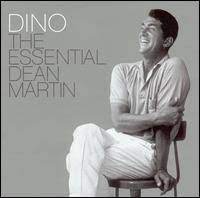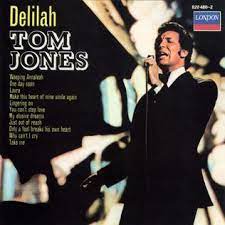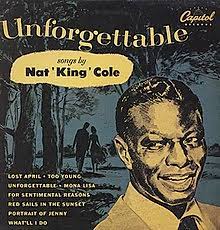Tutorial Pricing: $3.25ea OR any 10 for $10
(use code "Any10410" at checkout)
Paid Requests for $25ea
(comes with any 8 freebies -> so 9 for $25)
100's Of Free Demos & Chord Sheets
- Home
- Las Vegas Guitar Lessons
- Songs By Frank Sinatra
Songs By Frank Sinatra
On The Acoustic

Welcome to my songs by Frank Sinatra page where you'll find a collection of demo covers, free chord sheets in .pdf format and full lesson tutorials available for purchase if you require them for learning.
I'm using Frank Sinatra album covers on this page so you can associate where easy lesson originated.
Jump links to quickly access the sections.
Songs By Frank Sinatra
PDF's, Chords, Demos, Tutorials
1. Both Sides Now
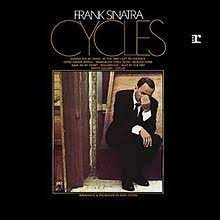
Both Sides Now was written by Canadian folk artist Joni Mitchell and originally just called Both Sides and was first recorded by Judy Collins. Frank Sinatra changed the title slightly and called it From "Both Sides Now" for his 1968 album "Cycles".
It's almost hard to imagine that 11 songs were recorded in just 3 hrs, but one of the songs got scratched for the final album release. This song was never released as a single.
For this one I play with a capo 1st fret in standard tuning but no lead work. Play a down down down down up down up down down and repeat rhythm pattern with the chords G, C/G, Bm, C, Am, D7, Dsus, D7sus and a D.
Jump To Top
2. Fly Me To The Moon
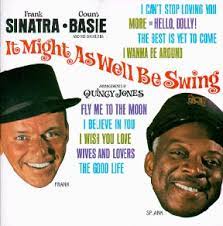
Fly Me To The Moon was written by Bart Howard who said later it took him 20 years to learn how to write a song in 20 minutes and this song was that result.
The initial title was "In Other Words" and when Peggy Lee popularized the song with her appearance on Ed Sullivan, she convinced Bart to change the name.
Frank Sinatra recorded the song for his 1964 album "It Might As Well Be Swing." But strangely enough, the song was never released as a single, and yet was one of Frank's most popular songs.
The chords here are E7, Am, Dm, G7, Cmaj7, F, A7, A7/A#, G# and a Dm7 with a bit of lead required in standard tuning. Play a down up down up and repeat rhythm pattern with some walking bass .
Jump To Top Of Songs By Frank Sinatra
3. I've Got You Under My Skin
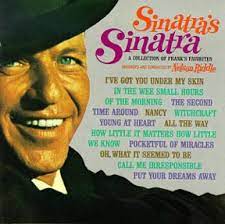
I've Got You Under My Skin was written by Cole Porter back in 1936 and the song was recorded in the 30's by Elanor Powell, Ray Nobel and Hal Kemp before Sinatra took his shot at the song.
Sinatra made several recordings of the song starting in 1946, then again in 1956 and again in 1963 and a live version from the Sands Hotel Copa Room in Vegas with Count Basie in 1966.
This one is played i standard tuning but has a few chords which are G, Dm7, Cmaj7, G7, Fm, Bm, E7, C, A#, G#, F, A7sus, A6 and an A7. No lead here as you play a down up down up down up rhythm patter with some bass runs
Jump To Top
4. My Way
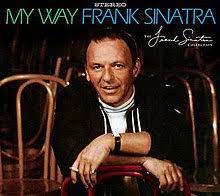
Way May was Frank Sinatra's most famous song and was first heard in French by Paul Anka while on holiday in southern France in the late 60's. Anka flew to Paris and negotiated rights to the song for $1... but royalties from Anka's version or anyone else's, were to be paid when due.
Anka re-wrote the song specifically for Frank Sinatra who recorded the song in one take on Dec 30th 1968 for the album of the same name, before heading to a New Years party at the SANDS Hotel in Vegas. Sinatra later came to hate the song as has been reported.
I play a capo 2nd fret on this one with the chords C, G6, Gm13, A7, Dm, F+6, Dm7, G, C7, F, Fm, Em and an Am7. Some lead in this song in standard tuning as you play a root up down up root up down up rhythm pattern with some chops throughout the latter part of the song.
Jump To Top Of Songs By Frank Sinatra
5. Nice N Easy
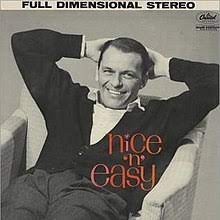
Nice N Easy was not only a great song, but the name of his 1960 album of ballads, with this song being the exception and only non-ballad track on the record.
The song was a single and peaked on the charts at #60.
This song has the following chords which are C, Caug, Am, G, Dm7, Gsus, G, G/D#, A7, E7, C+6, G7, F and a D7 in standard tuning. Play a down down down up down up and repeat rhythm pattern but no lead work.
Jump To Top
6. Please Don't Talk About Me When I'm Gone
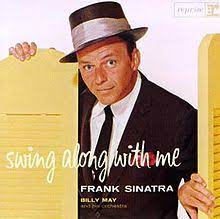
Please Don't Talk About Me When I'm Gone is an old 1930's tune recorded by Frank back in 1961 and put it on his "Swing Along With Me" album but the song was not released as a single from that album.
Others who have recorded this song were Ella Fitzgerald, Sammy Davis Jr, Dean Martin and Mose Alison to name a few.
A bit of picking in this lesson with the chords C, E7, A7, D7, G, G7, A and an Fm played in standard tuning. For rhythm I play a down up down up down up rhythm pattern with some walking bass.
Jump To Top Of Songs By Frank Sinatra
7. Something Stupid
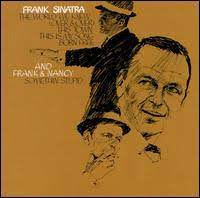
Something Stupid was recorded by Frank and daughter Nancy in 1967, a year after Carson and Gaile Foote put out their version.
The Sinatra's duet was a #1 smash hit both in the US and the UK. The track in on Frank Sinatra's album "The World We Knew".
This one has a drop D tuning but always optional, with some lead while playing a root down up down up root up down up rhythm pattern. For chords you'll need an Em, A, D, A7, D7, G, A#, D7, E7 and a Dmaj7.
Jump To Top
8. Strangers In The Night
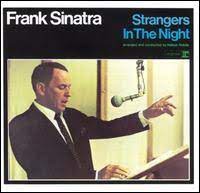
Strangers In The Night was originally given to a female Greek singer who thought it would sound better if a man sung the song.
So in 1967, Frank Sinatra delivered with a #1 hit in the US and UK. His album and the song won several Grammy Awards the following year in 1967.
Don't cha just hate it when that happens, she was probably thinking. This one has to be right up there with one of the best Frank Sinatra songs.
I play this one in standard tuning with a root up down up root down up down up and repeat rhythm pattern but no lead work. The chords here are D, Dmaj7, Em, A7, D, D6, Em7, Em6, Am7, B7, Gm and a Bm.
Jump To Top Of Songs By Frank Sinatra
9. That's Life
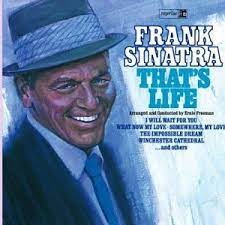
That's Life came on the radio and upon hearing OC Smith (the singer of Little Green Apples) sing this song, Frank pulled over and called daughter Nancy to find out who was the publisher.
So in 1966/67, That's Life peaked at #4 for Frank Sinatra and #3 in Canada. Many others then recorded the song including Aretha Franklin, Van Morrison, David Lee Roth just to name a few. Download my That's Life Frank Sinatra lyrics below.
Play this one with a capo 2nd fret and use a own up down up down down and repeat rhythm pattern. No lead here in standard tuning with the chords G, Em, Am7, D7, B7, A7, D, G7, C, D#, C#, C7, Fm, A#, A#m, G#, B, E, Eb and a G#7.
Unavailable At this Time
Jump To Top Of Songs By Frank Sinatra
10. Young At Heart
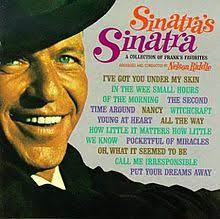
Frank Sinatra was the first to record this song back in 1953 and his version went to #2 the following year in the US and #12 in the UK but did not appear on any album until 10 years later in 1963 on the "Sinatra's Sinatra" album.
The song has also been recorded by Bing Crosby, Michael Buble, Barry Manilow and others. A movie, that was already in production, was renamed to this song title which starred Frank and Doris Day and was used in the opening and closing credits.
Dick Van Dyke recorded this song at age 90 using Franks original microphone back in 2017.
I play a capo 1st fret in standard tuning with the rhythm pattern root up down up root up down up and repeat. The chords here are G, Edim, Am7, D7, Gmaj7, G6, D, D7, Esus, E, Cm, D/Gb and an Em with some lead required.
Jump To Top Of Songs By Frank Sinatra
Thanks for stopping by my songs by Frank Sinatra page and I hope you found some useful info here.
